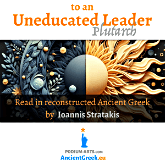• To An Uneducated Leader •
• Plutarch •

Duration: 19 mins 52 secs
Unabridged
Recorded: 2024
Price : $/€ 18 - 36
About “to an Uneducated Leader" by Plutarch
Drawing from various philosophical and historical examples, in this work Plutarch discusses the complexities of governance and leadership and the qualities required in rulers. He recounts Plato's refusal to draft laws for the Cyrenaeans due to their prosperity, highlighting the challenge of governing those who possess abundance, as they may resist external guidance. He emphasizes the importance of philosophical reason as a guide for rulers, contrasting it with the folly of those who prioritize power over duty, citing the example of Theopompus relinquishing power to avoid envy and danger. He criticizes rulers who display superficial traits of authority but lack true wisdom, who prioritize outward displays of authority over internal virtue, likening them to statues filled with clay and stone. Plutarch argues that rulers must first master self-control and moral integrity before they can guide their subjects effectively.
Furthermore, he explores the concept of justice as essential for good governance, suggesting that rulers should emulate divine qualities rather than earthly symbols of power. Plutarch suggests that rulers should fear failing in their duty to protect their subjects, rather than fearing their subjects themselves.
He contrasts the actions of noble rulers like Epameinondas and Cato with the paranoia of tyrants like Clearchus, emphasizing the importance of ruling for the benefit of the people.
Plutarch also discusses the role of philosophy in shaping virtuous rulers and warns against the corrupting influence of power. He uses the example of Alexander admiring Diogenes to illustrate the conflict between power and virtue. He concludes by likening corrupt souls to vessels with leaks, arguing that power exposes their flaws. He laments the tendency to criticize even minor faults in esteemed figures, suggesting that true virtue is often misunderstood or maligned.
You can follow the Greek text of “to an Uneducated Leader”, by Plutarch, online at the "Penelope" collection. A translation in English is also found on the same location. This work is also known as "To an Uneducated Ruler" and "Ad Principem Ineruditum".
About Plutarch
Plutarch of Chaeronea (Gr.: Πλούταρχος ὁ Χαιρωνεύς), born around 45 CE in the historically significant town of Chaeronea, was a Greek historian, biographer, and philosopher renowned for his insightful exploration of human excellence in political life. He studied philosophy under Ammonius in Athens, immersing himself in Plato's works at the Academy.
Plutarch's political engagement began under Nero, whom he later criticized as a tyrant despite acknowledging his actions in liberating Greece. Active in Roman politics, he served as an ambassador, lecturer, and befriended influential figures who aided his ascent into the equestrian order and Roman citizenship. Despite his travels across the Roman world, including Asia Minor and Egypt, Plutarch maintained loyalty to Chaeronea, where he continued his prolific writing.
His most famous work, "Parallel Lives," compares the virtues and vices of notable Greeks and Romans, while his "Moralia" encompasses over seventy treatises, dialogues, and speeches, revealing his multifaceted intellectual pursuits. Plutarch's enduring influence stems from his ability to blend historical narratives with moral reflections, offering timeless lessons on leadership and virtue. Despite his political engagements and literary fame, Plutarch remained devoted to his birthplace, ultimately passing away in Chaeronea around 120 CE during the reign of Emperor Hadrian.
More about Plutarch and his work you may read at "the great thinkers" website, or at the Stanford Encyclopedia of Philosophy website.
About the audiobook c.q. videobook
 The recording contains the complete, unabridged Ancient Greek text of “to an Uneducated Leader" by Plutarch. After purchase you will be able to download the relevant mp3 file. The videobook contains the audio recording presenting the Greek text anf (optional) subtitles in English.
The recording contains the complete, unabridged Ancient Greek text of “to an Uneducated Leader" by Plutarch. After purchase you will be able to download the relevant mp3 file. The videobook contains the audio recording presenting the Greek text anf (optional) subtitles in English.
You can listen to chapter 5 of “to an Uneducated Leader”, an audio sample of the present audiobook. Please, click on the play-button bellow and, if you wish, follow the Ancient Greek text lower on the page, or alternatively watch the video, which is provided with a translation in English. Thank you!
ΠΡΟΣ ΗΓΕΜΟΝΑ ΑΠΑΙΔΕΥΤΟΝ 5.
Οὐ γὰρ εἰκὸς οὐδὲ πρέπον, ὥσπερ ἔνιοι φιλόσοφοι λέγουσι, τὸν θεὸν ἐν ὕλῃ πάντα πασχούσῃ καὶ πράγμασι μυρίας δεχομένοις ἀνάγκας καὶ τύχας καὶ μεταβολὰς ὑπάρχειν ἀναμεμιγμένον· ἀλλ᾽ ὁ μὲν ἄνω που περὶ τὴν ἀεὶ κατὰ ταὐτὰ ὡσαύτως φύσιν ἔχουσαν ἱδρυμένος ἐν βάθροις ἁγίοις ᾗ φησι Πλάτων, εὐθείᾳ περαίνει κατὰ φύσιν περιπορευόμενος· οἷον δ᾽ ἥλιος ἐν οὐρανῷ μίμημα τὸ περικαλλὲς αὐτοῦ δι᾽ ἐσόπτρου εἴδωλον ἀναφαίνεται τοῖς ἐκεῖνον ἐνορᾶν δι᾽ αὐτοῦ δυνατοῖς, οὕτω τὸ ἐν πόλεσι φέγγος εὐδικίας καὶ λόγου τοῦ περὶ αὑτὸν ὥσπερ εἰκόνα κατέστησεν, ἣν οἱ μακάριοι καὶ σώφρονες ἐκ φιλοσοφίας ἀπογράφονται πρὸς τὸ κάλλιστον τῶν πραγμάτων πλάττοντες ἑαυτούς. Ταύτην δ᾽ οὐδὲν ἐμποιεῖ τὴν διάθεσιν ἢ λόγος ἐκ φιλοσοφίας παραγενόμενος· ἵνα μὴ πάσχωμεν τὸ τοῦ Ἀλεξάνδρου, ὃς ἐν Κορίνθῳ Διογένην θεασάμενος καὶ δι᾽ εὐφυΐαν ἀγαπήσας καὶ θαυμάσας τὸ φρόνημα καὶ τὸ μέγεθος τοῦ ἀνδρὸς εἶπεν
«Εἰ μὴ Ἀλέξανδρος ἤμην, Διογένης ἂν ἤμην·»
ὀλίγου δέων εἰπεῖν, τὴν περὶ αὑτὸν εὐτυχίαν καὶ λαμπρότητα καὶ δύναμιν ὡς κώλυσιν ἀρετῆς καὶ ἀσχολίαν βαρυνόμενος καὶ ζηλοτυπῶν τὸν τρίβωνα καὶ τὴν πήραν, ὅτι τούτοις ἦν ἀνίκητος καὶ ἀνάλωτος Διογένης, οὐχ ὡς ἐκεῖνος ὅπλοις καὶ ἵπποις καὶ σαρίσσαις. Ἐξῆν οὖν φιλοσοφοῦντα καὶ τῇ διαθέσει γίγνεσθαι Διογένην καὶ τῇ τύχῃ μένειν Ἀλέξανδρον, καὶ διὰ τοῦτο γενέσθαι Διογένην μᾶλλον, ὅτι ἦν Ἀλέξανδρος, ὡς πρὸς τύχην μεγάλην πολὺ πνεῦμα καὶ σάλον ἔχουσαν ἕρματος πολλοῦ καὶ κυβερνήτου μεγάλου δεόμενον.
